Rural Scene THE
BLOSSOMBERRY
NURSERY
PLANTS JOY IN JOHNSON COUNTY

KIDS IN THE KITCHEN: SIMPLE STRAWBERRY JAM RECIPE
Q&A WITH BOARD CHAIR CODY JONES
UNDERSTANDING YOUR CREDIT SCORE
FALL 2023
Farm Credit of Western Arkansas is a customer-owned financial cooperative providing financing and related services to farmers, ranchers, rural homeowners, agribusinesses and timber producers in 41 western Arkansas counties.
With a loan volume of $1.9 billion, Farm Credit of Western Arkansas is a member of the 107-year-old Farm Credit System, a nationwide network of borrower-owned lending institutions providing more than $357 billion in loans to rural America.
5 6 10 12 14 16 18
Director Scene
View 2023 director candidates and nominating committee nominees
Planting Joy
The Witt family’s journey to farming and floriculture

Taking Learning to the Field
Meet the four interns who joined Farm Credit’s team for the summer
2023 Scholarship Awards
Learn more about the 20 recipients of 2023 Farm Credit scholarships
Q&A with Board Chair Cody Jones
Learn more about Cody’s connection to Farm Credit and agriculture
Understanding Your Credit Score
Discover what you should know when it comes to your credit score
Canning with Kids
Follow this simple strawberry freezer
jam recipe and get your kids involved in the kitchen
ON THE COVER
OFFICE LOCATIONS AND LOAN OFFICERS
Alma 641 Hwy 71 North (479) 430–7287
Kaleb Brooks, Daniel Keeton, Joyce Ridenour
Arkadelphia 2858 Walnut (870) 246–8061
Benton 15227 I-30 South (501) 860–6391
Kevin Barham
Bentonville 3600 SW Regional Airport Blvd. Suite 16 (479) 273–3311
Dilynn Dodd, Catherine Goodwin
Clarksville 1007 Interstate Dr. (479) 754–2876
Taylor Plugge
Danville 302 E 5th St. (479) 495–2711
Kevin Morrison
De Queen 800 E Magnolia Ave. (870) 584–3113
Jordan Icenhower
Fort Smith 12907 Hwy 71 South (479) 434–4040
Kaleb Brooks, Daniel Keeton, Joyce Ridenour
Glenwood 131 Hwy 70 East (870) 356–2023
Kara Sharp
Greenbrier 89C N Broadview St. (501) 679–5464
Mandy Allen
Harrison 129 W Industrial Park Rd. (870) 741–2020
Brad Matlock, Brady Willis
Hope 1722 E 3rd St. (870) 777–6704
Cory Dice, Clay Lance
Huntsville 14238 Hwy 412 (479) 738–6622
Trey Villines
Magnolia 1703 Pittman St. (870) 234–8611
Caleigh Watlington
Mena 1607 Hwy 71 North (479) 394–1027
Rex Dollar
Morrilton 1329 Hwy 9 (501) 354–2377
Hank DeSalvo
Nashville 302 W Bishop (870) 845–2221
Kyle Webb
Ozark 1808 Farm Credit Dr. (479) 667–3855
Mike Gibbons
Paris 3772 W Hwy 22 (479) 963–2841
Kathy Schluterman
Prairie Grove 1181 E Heritage Pkwy (Hwy 62) (479) 400–6160
Russellville 2797 E Parkway (479) 968–5030
Anna Lester, Baxter Wallis
Siloam Springs 4970 Hwy 412 East (479) 524–6754
Savannah Dickinson
Texarkana 2305 Trinity Blvd. (870) 772–1882
Kelly Fatherree, Milly Lindsey, Rustin Watson
Tontitown 1091 W Henri De Tonti Blvd. (479) 717–6740
Misty Eastep
Waldron 502 Frankie Matthew Dr. (479) 637–2087
Rex Dollar
IN THIS ISSUE
the Witt family transformed their love for family and agriculture into a thriving business and magical place to share with others.
How
PUBLISHED BY
Rural Scene THE
2
I was recently asked by a rural electric cooperative to participate in a podcast and discuss the cooperative business model, particularly the seven cooperative principles. We talked specifically about the seventh principle: “Concern for Community.” During the podcast, I shared that a cooperative is, first and foremost, service-oriented. Earnings are a byproduct. That may sound extreme, but from a 30,000-foot view, it holds true.
We must retain earnings to meet specific regulatory and funding bank financial ratios. Like any business, we also have overhead, such as employee payroll, but when you peel back the layers, service to our community is the heart of the cooperative model. The model also holds true by returning our profits to our membership as a patronage payment once overhead and strategic needs are met. In 2023, we gave back $11 million in patronage to Western Arkansas members. All early indicators show the trend should continue for this year’s payout in the spring of 2024. The cooperative model is a unique business model that has held the test of time, and Farm Credit has been modeling it for over 100 years.
In the financial sector, the cooperative model shines brightest not during our busiest or best times but during difficult times and economic challenges. The current economic conditions are undoubtedly challenging, with the federal reserve trying to fend off a recession that has rushed in some of the highest interest rates we have seen in many years. The higher rates typically equate to slowing consumer demand, but so far, demand is still relatively strong, as are wages and the employment rate. The Feds have been clear on their strategy of raising rates until an apparent indication inflation is waning. The results are a tightened cash flow for consumers and farmers on their borrowing needs and higher everyday costs until inflation subsides.
It all circles back to “concern for community.” Despite the economic challenges farmers and consumers face, we will continue to serve and aid our members as we always have.
Chair Cody Jones, Mansfield
Vice Chair Steve Burke, Prescott

Renny Chesshir, Alma
Kim Hogan, Ozark
Ron Hubbard, London
Julie Lively, Fulton
The Rural Scene is produced for members and friends of Farm Credit of Western Arkansas.
Address comments and story ideas to:
Editor, The Rural Scene Farm Credit of Western Arkansas 3115 W. 2nd Court • Russellville, AR 72801
Editor Lindsey Holtzclaw • Lindsey.Holtzclaw@myaglender.com

Contributing Writer & Photographer Abby Sanders • Abby.Sanders@myaglender.com
myaglender.com
Article quotes have been edited for content and appropriateness.
Member of the Cooperative Communicators Association.
© 2023 Farm Credit of Western Arkansas.
 Farm Credit of Western Arkansas is an equal opportunity employer and does not discriminate on the basis of race, color, religion, gender, sexual orientation, gender identity or expression, national origin, age, disability, genetic information, marital status, amnesty, or status as a protected veteran in accordance with applicable federal, state and local laws.
Brandon Haberer
Farm Credit of Western Arkansas is an equal opportunity employer and does not discriminate on the basis of race, color, religion, gender, sexual orientation, gender identity or expression, national origin, age, disability, genetic information, marital status, amnesty, or status as a protected veteran in accordance with applicable federal, state and local laws.
Brandon Haberer
LETTER FROM THE CEO
President and CEO
BOARD
OF DIRECTORS
ABOUT THE RURAL SCENE
Allen Moore, Lincoln
Elizabeth Walker, Horatio
Mark Wilcox, Greenbrier
Steve Young, Paris
President and CEO Brandon Haberer
Brandon Haberer
FOLLOW US ON SOCIAL MEDIA!
3
Find us at “Farm Credit of Western Arkansas” on Facebook, and @FarmCreditWEAR on Twitter and Instagram.
I enjoyed speaking with fellow members and Farm Credit of Western Arkansas employees at my local branch's summer social in June. Sometimes I get asked what makes Farm Credit of Western Arkansas different from other lenders. The answer is easy: Farm Credit of Western Arkansas truly cares about its members.
This summer, many branches held summer events for members. During fair season, you'll often find our branches cooking for livestock exhibitors and their families or supporting them during the premium auctions.
Farm Credit of Western Arkansas consistently donates to 4-H and FFA and awards over 20 college scholarships to students every year. I personally have not seen any other lender do so much for their customers. That is genuinely the difference. You are not just a customer at Farm Credit, but you are a member. As a member, you get to share in the profits by receiving a patronage refund check when we have a good year, an annual tradition since 1997. You are also paid interest on your Funds Held account.
Since Farm Credit of Western Arkansas is a Government Sponsored Enterprise, you receive favorable interest rates, terms, and protections that other lenders can't



provide. You also have a say in who sits on the Board of Directors. Having a voice matters! Like all my fellow directors, I am a farmer like many of you. We know who we represent, so when we make new policies or have to make tough decisions, we always try to do what is right for the association and our fellow members. You receive a ballot to vote for directors and Nominating Committee members every year. I encourage everyone to take the time to read the candidates' information so you can make an informed decision.

Remember that you can vote in every area, not just the one you live in. Farm Credit of Western Arkansas will also donate $5 to FFA and $5 to 4-H for every eligible ballot that gets turned back in, so your vote also helps support a great cause.
This past summer was way hotter than what I was hoping for. If you are anything like me, you are excited to see the crisp fall air returning. Nothing beats sitting around a campfire with friends watching the Hogs play on a cool fall evening!
DIRECTOR SCENE LETTER FROM THE BOARD CHAIR
Cody Jones Chair, Board of Directors Farm Credit of Western Arkansas
Cody Jones
2023 Annual Director Election
Ballots will arrive in your mailbox, voting is your right and responsibility as a cooperative member.
• Director candidate information and ballots will mail September 12, 2023. Ballots will be addressed to voting stockholders as of date of record – July 31, 2023.
• Review candidate information, complete ballot, and return in postage-paid envelope provided. You may vote for one director in each area up for election.
• Voting stockholders are responsible for electing directors and nominating committee members annually.
• Ballots must be received by 4:30 PM on October 11, 2023. Results will be announced October 12 and posted at all branch offices and at myaglender.com. Postcards will also be mailed to members.
2023 Director Candidates Listed Alphabetically
(All positions are a four-year term.)
AREA 1
AREA 2
AREA 3
Audie R. "Renny" Chesshir Crawford County
Robert W. Caldwell
Yell County
Steve Burke Hempstead County
Jeff D. Ray Sebastian County
Gerald W. Strobel Logan County
Robert Martinez Sevier County
Nominees for 2024 Association Nominating Committee
(All areas for a one-year term.)
Chad E. Amos • Benton County
AREA 1A AREA 3A
Johnny L. Gunsaulis • Benton County
AREA 1B
AREA 1C
John W. Calhoon, Jr. • Washington County
Ronnie T. Horn • Washington County
Kirkland "Kirk" W. Delk • Boone County
Carol A. "Ann" Russell • Sebastian County
Rainna K. Ghormley • Hempstead County
Andrew Tankersley • Hempstead County
Danielle M. Kitchens • Howard County
Gabrielle E. Williams • Garland County
Patricia Ann Maben • Sevier County
Suzanne L. Watkins • Hempstead County
AREA 2B
AREA 2C
Ernest J. "EJ" Neissl • Franklin County
Mary "Jeana" Sing • Franklin County
Casey T. Cotton • Logan County
Ronnie R. Whitley, Jr. • Logan County
Jerry L. Hartwick • Faulkner County
Wade Wiedower • Faulkner County
DIRECTOR SCENE
AREA 2A AREA 3B
AREA 3C
AREA 1 AREA 2 AREA 3 Baxter Marion Boone Carroll Benton Washington Perry Saline Grant Garland Hot Spring Montgomery Dallas Howard Sevier Little River Miller Lafayette Columbia Union Calhoun Ouachita Nevada Hempstead Clark Pike Polk Scott Sebastian Logan Yell Crawford Franklin Johnson Pope Faulkner Madison Newton Searcy Van Buren Conway ● Bentonville ● Tonitown ● Harrison ● Prairie Grove ● Ozark Russellville ● Paris ● Danville ● Benton Morrilton ● ● Greenbrier ● Mena ● Glenwood ● Arkadelphia ● De Queen ● Nashville ● Texarkana ● Magnolia ● Hope ● Fort Smith ● Huntsville Siloam Springs ● ● Clarksville ● Waldron 1 2 3
5
Planting Joy
The Witt Family's Journey to Farming and Floriculture

6
The Witt Family: Courtney, Andrew, Oakley, Wyatt and Wade
“Have you ever considered selling your business?” a hopeful Courtney Witt asked through the phone.
When the voice on the other end of the line said no, Courtney thanked them for their time and quickly hung up, slightly embarrassed for her wishful thinking.
Early on, the Witts dreamed of a rural lifestyle. Courtney and her husband, Andrew, were living in California when they began raising a backyard flock of chickens. The hobby sparked a passion for agriculture in the young couple, and Andrew decided to enroll in a livestock management program at their local community college.
As graduation neared, the couple began discussing moving to Texas when one of Andrew’s professors, an Arkansan himself, promised extra credit if they took an exploratory trip to Arkansas during spring break.
The Witts fell in love with the Arkansas hills and laid-back atmosphere, eventually landing on Johnson County as their new home in 2015.
Fast forward several years – and three babies – later, the Witts were living their dream on a small cattle farm while working two off-farm jobs. While the couple was grateful for how far they had come, they longed for more time together as a family, which led Courtney to dial the number for Blossomberry Nursery in early 2022.
She had been driving by the Clarksville nursery and thinking about how much she enjoyed the place, so she followed her gut and called to see if they had any interest in selling.
After a disappointing rejection, two weeks passed before Courtney received an unexpected phone call from the owner of Blossomberry. After their conversation, the owner and her husband had reconsidered and decided to sell their nursery. There was just one problem: Courtney had yet to mention the nursery plan to Andrew.
After many in-depth conversations, the couple decided the timing wasn’t right. Courtney still needed to finish the school year teaching, and Andrew had recently accepted a new job helping manage a cattle ranch. They graciously declined, and Blossomberry’s owners listed the nursery with a realtor.
As the school year finished, Courtney decided to stay home with her children instead of returning to the classroom. Summer went by without a mention of the nursery until one night, Andrew asked, “Do you think we made a mistake?”
Remarkably, Blossomberry Nursery was still on the market months later, and Courtney and Andrew reopened the discussion about the purchase. Something told them now was the right time.
Through a series of fortunate events – the right appraisal price, a cash offer on their original home and farm, and a quick closing with Farm Credit, the Witts found themselves the proud new owners of Blossomberry Nursery in January 2023.
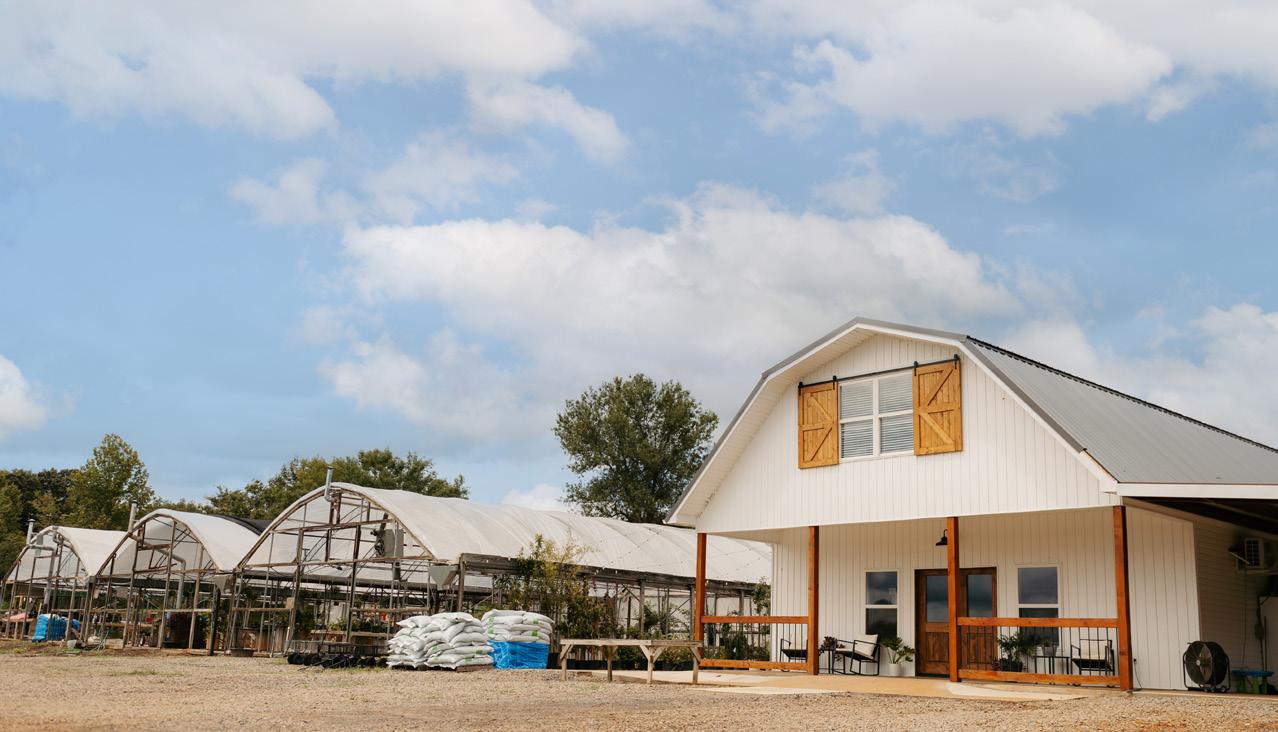
In less than a year, the Witts have transformed the nursery by giving the grounds and store a complete makeover and converting the back part of the building into their new home.
Shaping and growing their own business has come with its share of challenges, from learning how to grow plants in greenhouses to discovering how to produce income in all seasons.
“It felt a lot like diving off the deep end of a wave pool with ankle weights on,” Courtney says, laughing when asked how they learned to manage a nursery without a horticulture background. “But we have been so thankful for all the people who have helped us.”
7
The storefront at Blossomberry Nursery also serves as the Witt’s home, allowing them to be on site to serve customers and address any needs as they arise.
The people of Johnson County and the agriculture community rallied around the Witts as they found their footing as new business owners.
Stan Brown, the nursery’s founder, served as a mentor and inspiration for the couple as they dreamed of the future. Wholesale nurseries, the Fruit Research Station, and their local extension agent, Jesse Taylor, provided a wealth of education for the Witts as they learned more about growing plants.
Another group quick to offer tips and tricks to help them get started were the seasoned customers of Blossomberry Nursery.
“There is no overstepping,” Courtney says. “Whatever you want to share, suggest, or teach, we are all ears.”
While horticulture is at the heart of the nursery, Andrew and Courtney also saw it as a way to share their farm and lives with others. From hosting family gatherings to cooking breakfast for neighbors on Sunday mornings, they love to share their blessings.
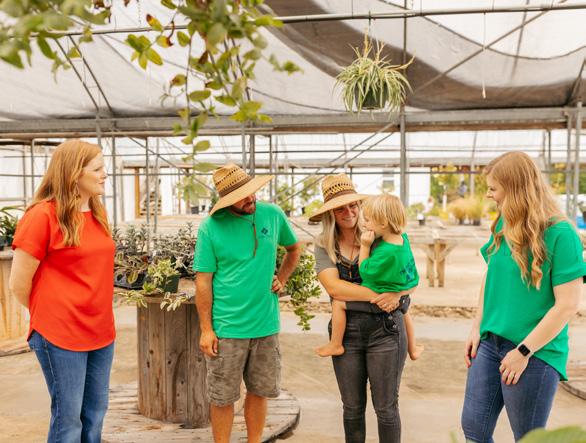
Courtney didn't take long to brainstorm ways to invite more people to their new piece of paradise. Soon, Blossomberry Book Club was born.
“I shared it on Facebook and was so nervous thinking that no one would want to join,” Courtney says.
Today, the book club has grown to 80 plant and book lovers. The club meets every two months at Blossomberry Nursery to discuss horticultural-themed books. It has also allowed many friendships to bloom.
The dreaming did not stop there. Realizing they had plenty of parking space, the Witts added a U-cut flower farm as an attraction to Blossomberry Nursery. Today, rows of brightly colored zinnias and vibrant cosmos greet you as you pull down the gravel drive.
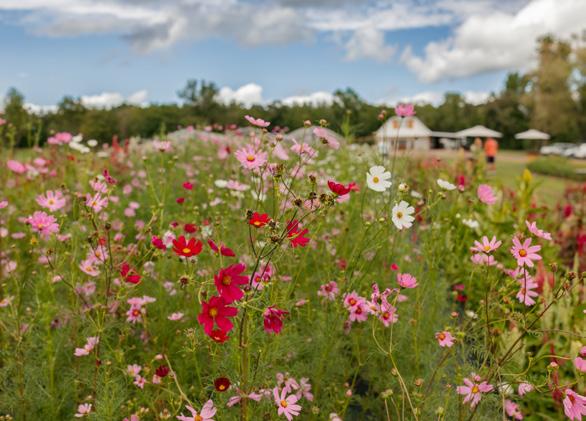
In the eight short months since signing the papers to purchase Blossomberry, the Witts have hosted many other events on the farm and in their community, including yoga, library readings, date nights for couples, and even a pop-up visit from a coffee truck.

Looking towards the fall and winter, Blossomberry will feature sunflowers, a pumpkin patch, fall festival activities, and Christmas trees. In the future, the Witts hope to host more events on the farm and are exploring the idea of hosting garden weddings among the towering crape myrtles on the back of the property. They are also creating an educational nonprofit to offer farming, gardening, and homesteading classes.
 Anna Lester (far left) and Taylor Plugge (far right) have served as the Witts loan officers throughout their purchase and growth of Blossomberry Nursery.
Anna Lester (far left) and Taylor Plugge (far right) have served as the Witts loan officers throughout their purchase and growth of Blossomberry Nursery.
8
Courtney sits near the register inside Blossomberry Nursery’s storefront. The shop features houseplants, garden supplies, and local products.
As the Witts breathe life back into the nursery, the rich 40-year history of Blossomberry is not something they take lightly.
“This place is such a huge piece of Johnson County history. So many people come up to us and say, ‘Some of my best childhood memories were at Blossomberry,’” Courtney says.
Andrew and Courtney recount a recent visit from a man who created many beautifully arranged bouquets. The couple was surprised he didn’t have formal floral experience and instead worked in construction.
As he paid for his flowers, the man told them he grew up coming to Blossomberry with his grandma, who just turned 97. He had created the floral arrangements to surprise her.
“Moments like that make everything worth it,” Courtney says. “To share such a special, magical place with people.”
Blossomberry is also the backdrop for many important memories for the Witt children. They may be young, but each child is discovering what they love most about the nursery.
Oakley, age six, is a professional bouquet maker who loves to help visitors in the flower patches. She’s also a young entrepreneur, frequently presenting ideas like selling her heirloom tomatoes near the register.


While Wyatt, age four, was very passionate about their cattle farm, he is finding new things to appreciate at the nursery, like swimming in the pond or visiting the co-op with Dad.
One-year-old Wade loves to dig in the dirt, smell the flowers, and bring joy to customers with his bright smile. Since he was seven-months-old, Wade has accompanied his mom in the gardens and greenhouses in a baby carrier strapped to her chest.

From their children to the wide range of visitors they welcome each week, Blossomberry Nursery is a place enjoyed and cherished by all generations.

“We wanted this to be a place where people can come and bring a book and enjoy a picnic with their kids," Andrew says. "Just go out, sit in the fields, and let your kids roam and be kids."
Courtney agrees, saying, "Life can be so busy and hectic. We hope it's a break from all that when they come here."
Whether it’s giving a cutting to a child who arrives with a spark in their eye or listening to stories from a plant veteran who has kept the same houseplant alive for more than 30 years, the Witts are growing joy and a little bit of magic inside the hearts of each visitor at Blossomberry Nursery.
Oakley Witt (Age 6)
Story and photos by Lindsey Holtzclaw
Wade Witt (Age 1)
9
Wyatt Witt (Age 4)
TAKING LEARNING TO THE FIELD
Each year, Farm Credit invites talented students to join our team for the summer to learn how Farm Credit works and what an employee's day-to-day life looks like. We caught up with our four summer interns to learn more about their summer experiences and why they enjoyed their Farm Credit internship.

SARAH BARKHIMER Communications Intern
Sarah Barkhimer joined Farm Credit of Western Arkansas as a communications intern for the summer of 2023.
She is a senior agribusiness major at Southern Arkansas University. She often helps her family on their small swine breeding operation in Camden, Arkansas. Sarah’s family has always taught her how important agriculture and nature are. From when she was little, she remembers being outside hunting, fishing, working in the garden, camping, or simply enjoying nature. In high school, Sarah joined FFA, where she started considering a future in agriculture.
Farm Credit often sponsors events on Southern Arkansas University's campus, where Sarah first heard about Farm Credit. After her first year of college, Sarah secured a summer job with a marketing and advertising company.

“I have always wanted to have a future in ag, but I had become interested in marketing and advertising. When I heard that Farm Credit had a communications internship, I was immediately drawn to it,” she said.
Sarah helped the Marketing and Communications Team with many projects and tasks this summer. These range from conducting interviews, writing articles for the blog and magazine, designing the annual t-shirt, and creating graphics for use on social media.
"My internship gave me a way to combine two things that I had become passionate about,” she said.
Sarah will graduate from Southern Arkansas University in May of 2024. After graduation, she plans to pursue her master’s degree and hopes to begin a career in agriculture communications or marketing.
AUSTIN BELL Field Services Intern
Austin Bell joined Farm Credit of Western Arkansas as a field services intern covering northwest Arkansas for the summer of 2023. He is a senior agribusiness major at the University of Arkansas. Growing up in Cabot, AR, Austin’s primary exposure to agriculture was his grandpa’s cattle operation. Austin pitched in with anything his grandpa needed help with, from breeding cows to cutting hay.
Although Austin knew little about Farm Credit before his internship, the idea of working in ag finance has always appealed to him. When he heard about the internship, he was immediately interested. The friendliness of the interviewers is what sealed the deal for Austin. He could connect with the Farm Credit representatives and feel relaxed even in a tense situation.
Throughout this summer, Austin helped in many aspects of Farm Credit operations. For him, every day is different. He could start in the office completing morning reports, greeting customers, answering phones, writing receipts for checks, or disbursing checks on loans, or he could be out in the field meeting with farmers, inspecting and evaluating collateral, or shadowing appraisers.
"I've enjoyed learning the business as a whole,” he said. “I'm learning each position and how to do the different day-to-day activities of not just loan officers but appraisers and customer service representatives as well."
Austin will graduate in December 2023. After graduation, he plans to either stay in northwest Arkansas and pursue a career in agriculture lending or go to northeast Arkansas to work in the steel industry.
10
COLTON HEWITT Field Services Intern
Colton Hewitt joined Farm Credit of Western Arkansas this summer as a field services intern covering southwest Arkansas. He is a senior agribusiness major at Southern Arkansas University. Growing up, Colton was very involved in agriculture. His family has a registered Simbrah cattle operation in his hometown of Fouke, AR. Colton was also in 4-H for seven years and in FFA for four years, where he showed livestock.
While many say Farm Credit feels like family, the family connection is literal for Colton. His older sister, Kyleen Hewitt, was an intern in the same position as Colton during the summer of 2022. He said seeing how much Kyleen enjoyed her internship made him want to apply this year. Colton’s parents are also Farm Credit members.
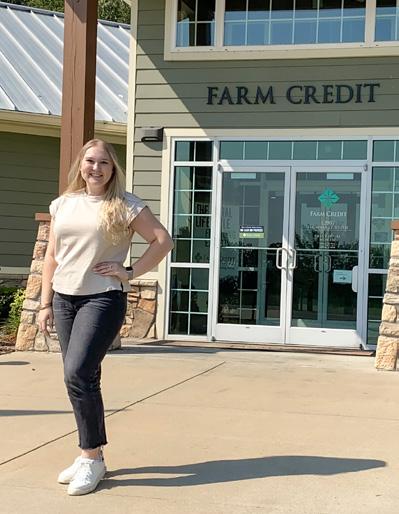

"My family has been members of Farm Credit for years and have had great experiences with Farm Credit. I thought it seemed like a great place to work, and I was right," he said.
A typical day for Colton started by gathering a list of inspections or evaluations he was responsible for. After gathering his list, he scheduled and mapped out his visits by contacting each member. Finally, he'd finish the task by filing reports once he completed his assessments. Some tasks Colton helped with this summer included construction inspections, FSA inspections, chattel evaluations, and land and building appraisals.
“I have enjoyed learning about chattel evaluations the most this summer because they allow me to visit with the members, see their operations, and see how different people run their farms,” he said.
Colton will graduate in May of 2024. After graduation, he hopes to start a career at Farm Credit and his own cattle operation.
SHAE PARSONS ANGEL Field Services Intern
Shae Parsons Angel joined Farm Credit of Western Arkansas for the summer of 2023 as a field services intern covering the River Valley portion of our territory. She is a senior at Arkansas Tech University majoring in agricultural education.
Shae grew up in Branch, Arkansas, on her family’s small cow/calf operation. Her passion for agriculture emerged through her involvement with FFA throughout high school. Shae has continued to foster her love for agriculture during her college years through professional organizations within the ATU Agriculture and Tourism Department and Arkansas Women in Agriculture.
Shae’s involvement with Arkansas FFA throughout high school and college is how she learned about Farm Credit, thanks to Farm Credit’s sponsorship and support of the organization. “Before joining the Farm Credit team, I understood that Farm Credit was an agricultural lending institution, but since beginning in May, I have had the opportunity to experience aspects of each department at Farm Credit,” she said.
Shae worked on tasks this summer, including FSA inspections, chattel evaluations, creating a fillable input form and closing communication form for loan officers, supporting customer service representatives by answering phone calls, and attending events with branch staff. She has enjoyed learning about appraisals, lending, and operations this summer, but she has also enjoyed learning more about each county in the River Valley region and the Farm Credit members who live there.
Shae will graduate in December 2023. After graduation, she plans to pursue her master’s degree in educational leadership and a career in education. Shae and her husband, Ethan Angel, were married at the end of June.
By Sarah Barkhimer
11
$380,000 in scholarships awarded since 1998

$1,000
Scholarships
Awarded to 20 Area Students
Farm Credit of Western Arkansas awarded $20,000 in academic scholarships to some of western Arkansas’ most talented young people again this spring.



Academic performance, school and community leadership, extracurricular activities, and agricultural interests were considered as a panel of independent judges from outside Farm Credit of Western Arkansas’ service territory selected this year’s recipients.
Some were raised on farms and have future career aspirations that include agriculture. Others value the rural lifestyle but are following less agriculturally related career paths. All have proven themselves as leaders among their peers and in their communities.
Congratulations on your proven accomplishments. Thank you to all who applied. 2024 scholarship program details will be posted at myaglender.com after January 1.
Ozan, AR
Cossatot Community College
Exercise Science
Ozan, AR
Southern Arkansas University
Agribusiness
Siloam Springs, AR
Arkansas Tech University
Secondary Education
Fayetteville, AR
Harding University
Business Management
Jake Brinkman
Savannah Jackson
Emma Norberg
Zaina Vanlandingham
SCHOLARSHIP AWARDS 12
Strong,
Southern Arkansas University
Elementary Education
Scranton, AR
University of the Ozarks
Elementary Education
Agribusiness
Norman,
Arkansas
Bigelow,
Arkansas Tech University
Agribusiness
Clarksville, AR
Arkansas Tech University
Physical Therapy
Fayetteville, AR
University
Agricultural Economics
Taylor, AR
University of Arkansas Biology/Pre-Dental













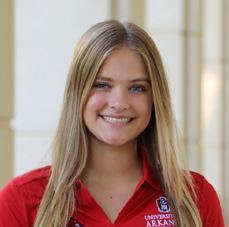


Magnolia, AR
University of Arkansas
Animal Science
Siloam Springs, AR
Texas A&M University
Poultry Science
Charleston, AR
University of Arkansas
Agribusiness
Dardanelle, AR
Arkansas Tech University
Business Management
Lamar, AR
University of Arkansas
Poultry Science & Ag Education
Hudson Cheatham
Presley Lemon
Molly Parker Hatlee West
Rose Gunther
Reese Mitchell
Khloi Turner
Karley Williams
Hannah Burns
Kynlei Layes
Ashley Ober
Westen Vardeman
MJ Cureton
Maddie McDonald
Madison Price
Alli Whitehead
Van Buren, AR U of A – Fort Smith Electrical Engineering Technology
Lead Hill, AR Arkansas Tech University
of Arkansas
Rudy, AR Arkansas Tech University Horticulture
AR
AR
AR
Tech University Athletic Training
Texarkana, AR UAHT – Texarkana
Dental Hygiene
COOPERATIVE Q&A
We visited Board Chairman, Cody Jones, at his farm in Mansfield to learn more about his connection to agriculture and Farm Credit.


How did you get started in agriculture?
My parents grew up farming in northwest Missouri and decided they wanted to have a different life for them and their children. We moved to several different states for my father’s job and ended up moving to Arkansas when I was eight. I later graduated from Greenwood High School before pursuing my bachelor’s degree at Arkansas Tech University. After graduating college, I worked for Tyson Foods in production management, and when our daughter, Hallie, was born, I decided I needed a change. We moved back closer to Greenwood and bought 160 acres where ironically, we decided to try farming.
You’ve been farming now for 18 years, what’s your best advice for those just getting into the profession?
Treat it like a business. Keep the farm accounts separately, track all your income and expenses, and your assets. Most people that are successful in farming treat their operation this way.
Does your daughter, Hallie, have any interest in continuing farming?
She’s been working every summer in the chicken houses and she’s a hard worker, but she wants to go on and be a CPA. But everyone has a connection to agriculture. Maybe she will go on to do accounting for farms and agriculture.
Why did you choose to do business with Farm Credit?
When I got started, I actually got a loan with a different bank. Andrea Leding (former loan officer, and current senior vice president of commercial/ag lending) came to my house, what seemed like daily, to try to get me to do business with Farm Credit. I’m glad I did. I didn’t know how important it was to become a Farm Credit member. Everyone knows when you start a farm, you have a lot of depreciation, you buy a lot of equipment, and your taxes don’t look great. It looks like you’re losing money. Over time, you start to break even, and then make money. Eventually, you start to turn a profit and with that comes more taxes. At my old bank, I wouldn’t have been ready for that. At Farm Credit, I put money back in Funds Held and the day came I needed that money for taxes and I was so thankful it was there.
What would you tell someone to encourage them to choose Farm Credit over a traditional bank?
Number one, Funds Held. Also, the patronage refund. I didn’t know this until I got on the board, but being a GSE (Government Sponsored Enterprise), Farm Credit has special regulations they abide by. Everybody knows in farming there are good times and bad times. Farm Credit is going to do their best to work with you and help you stay farming. With commercial banks, that is not always the case. Your loan might get sold to a secondary market. At Farm Credit, you can talk to someone that knows farming and has your back.
14
What motivated you to run for the board of directors?
When I was first approached about running for the board, I said, “I’ll have to call you back.” I knew it was a big time commitment and with the poultry houses, it’s really hard. In the end, I wanted to give back. I’ve served on several boards, but to me, I think Farm Credit is such a great organization. Until I became a board member, I didn’t know how great it was. As I learned more about it, I saw how unique our association is and how important it is to have a voice.

What is one of the most surprising things you’ve learned since being on the board?
That there are so many Farm Credit associations. Before I came on the board, I thought Farm Credit was Farm Credit. We are really proud to be Western Arkansas, and we want to keep it that way. Our management team and employees understand that if we keep finding new ways to stay profitable, we can keep local people and local decisions.
As chair of the board, what are your priorities?
To work as a team with the CEO and the senior management team. We all want to see our association stay profitable. The CEO and senior management team are doing a great job of finding new ways to accomplish this. Staying profitable allows us to keep paying patronage refunds, keep making loans, and allows us to stay Farm Credit of Western Arkansas. One thing that I am proud that we've accomplished so far is term limits on the chair and vice chair positions on the board of directors. In my opinion, this keeps ideas fresh and board members motivated to learn and grow in their roles.
Why is it important for Farm Credit members to participate in the cooperative?
Farm Credit is unique because we have a board of members. By voting, you’re making your voice heard. Just like any election, if you’re not voting, you’re not taking advantage of the voice you’re given. It’s important to be part of something bigger than yourself, and that is what Farm Credit is.
How can members take on a leadership role in Farm Credit?


There’s the advisory committee, nominating committee, and of course the board of directors. There are also opportunities to get involved with our district bank, AgriBank. The nominating committee generally meets in May. If someone wants to get involved, they can contact the nominating committee or the central office in Russellville. Ballots will be mailed to members in September, and I encourage everyone to take part and make their voice heard.

15
Understanding Your Credit Score
When applying for financing, the term “credit score” is sure to come up in conversation. We asked Jody Almand, VP of Credit, and Justin Carter, Chief Credit Officer, to answer frequently asked questions regarding credit scores.
• What is a credit score?
A credit score is a number used to anticipate future behavior based on historic management with other creditors. Simply put, it tells potential lenders how reliable a potential borrower is based on past lending history.
• What factors affect a credit score?
Many factors can affect or influence your credit score. These include:
• Past payment history: Paying your bills on time is one of the most significant factors when calculating your credit score, and doing so will allow you to keep your score strong.
• The number of open accounts you have: Any time you open a new account, it adversely affects your credit score, including applying for new loans and credit cards. Having multiple retailers can affect your score over time.
• Length of time accounts have been open: Opening several accounts in a short amount of time can hurt your credit score. Newer accounts can bring down the average age of your credit history, lowering your credit score.
• Percentage of outstanding balances of credit cards compared to the credit limit: Having and keeping high balances on credit cards can hurt your credit score. It is best to keep credit card debt to a minimum to keep a healthy score.
• Collection accounts: When debt is sent to a collection company and reported to the Credit Bureau, it will negatively impact your score. This stays on your report and adversely affects the score for up to 10 years, regardless of payment status.
• Bankruptcies: Filing for bankruptcy will stay on your credit report for years. It can continue to hurt your credit score for 10+ years.
• Number of times your credit is pulled: When lenders pull your credit score, it is considered a hard hit. One hard hit per year does not damage your score, but multiple within a year can negatively impact your credit score. To avoid this, some businesses will pull a soft hit on your credit report. Soft hits do not affect your score negatively.
• Why is a credit score important?
The theory that past behavior predicts future performance makes credit scores very important. Lenders consider credit scores one of many factors to determine a borrower’s creditworthiness.
16
• Why do lenders use credit scores?
A credit score gives lenders a strong indication of how a borrower will perform with the proposed loan. If they have shown a strong repayment history, it is a better indication that they will continue to manage their financial matters well in the future.
• What are the different types of credit scores? Which does Farm Credit use?
Three companies report to the credit bureau and assign a FICO score. These three companies are Equifax, Experian, and Transunion. Farm Credit utilizes Transunion to obtain credit scores for our borrowers.

• What is a good credit score/range?
Credit scores can range from 300 – 850. A score above 700 is considered good and shows that the borrower has managed well in the past. A score that falls between 650 and 700 would be considered moderate. A score below 650 is considered weak. As with anything, these scores are subjective.
• Some scores in the moderate range do not automatically denote poor performance, as one recent delinquency can initially hurt your score. The credit score improves as more time passes from the late payment. Many factors affect the credit score, as explained above. Farm Credit analyzes the entire credit report and not merely the score.
• How can you improve your credit score?
The best way to improve your credit score and keep a strong one is to pay your bills on time. If your score is weak, you will need to begin paying all bills on time and allow ample time to see your score improve. Credit scores do not improve overnight, nor is there a trick to bring a score up quickly. Diligence in paying your bills on time will elevate your score.
• How can you check your credit score?
Several websites provide a free credit score. Most of these only pull the score and are considered “soft hits” on your credit reports. Soft hits do not adversely affect your score. You are allowed one hard hit on your credit report each year that will not hurt your score. Doing this annually is a good idea to ensure there are no fraudulent charges on your credit report.
By: Sarah Barkhimer, Communications Intern
17
Canning with Kids
While bringing your kids into the food preservation process can be intimidating, there are many reasons to get children in the kitchen early. Below, I’ve provided the top developmental benefits of canning for kids and a beginner-friendly recipe you can make this fall.


Developmental benefits:
• Crushing berries develops fine and gross motor skills.
• Measuring cups of berries and sugar helps with counting skills and proper measuring techniques for different ingredients. Kids also have an opportunity to measure when they ensure the right amount of head space in each jar.

• When you let your berries and sugar sit, dissolve the pectin, or stir, use an analog clock to help with time-telling skills.
• Ladling the jam into containers helps improve hand-eye coordination.
• While cooking, take the opportunity to have meaningful conversations. You can talk about the role of ingredients, food spoilage, the importance of canning, or just spend quality time in the kitchen.
Strawberry Freezer Jam Recipe
Ingredients:
• 2 cups crushed strawberries or blackberries (about 1 quart berries)
• 4 cups sugar
• 1 package powdered pectin
• 1 cup water
Yields about 5 or 6 half-pint jars
Instructions:
1. Place prepared berries in a large mixing bowl.
2. Add sugar, mix well, and let stand for 20 minutes.
3. Dissolve pectin in water and boil for 1 minute. Add pectin solution to berry-and-sugar mixture, stir for 2 minutes.
4. Pour jam into freezer containers or canning jars, leaving ½ inch headspace at the top.
5. Close covers on containers and let stand at room temperature for 24 hours.
Recipe courtesy of the University of Arkansas System Division of Agriculture
 By: Casey Ford, County Extension Agent Staff Chair from Franklin County
By: Casey Ford, County Extension Agent Staff Chair from Franklin County
19
Johnson County Cattle Camp
The Clarksville branch partnered with their local 4-H program to sponsor Cattle Camp. The camp covers topics such as nutrition, daily care, and showmanship to help 4-H'ers improve in the show ring.


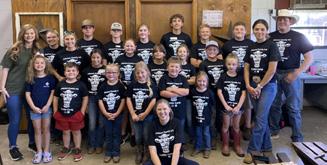
Spark Pendergrass Tour
Spark, our employee engagement group, toured Pendergrass Ranch in Franklin County to learn more about a member’s operation.


Summer Community Events
Several branches hosted summer events to help beat the heat and check in with members.

Hope Rotary Club
4-H Scholarships


Clay Lance, Hope loan officer, joined his local Rotary Club to pick up trash along their adopted mile of highway.

Clarksville Trash Pickup
The Clarksville and Russellville branch picked up trash on their adopted mile of highway.

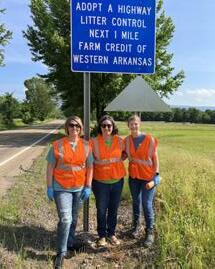
Greenwood Rodeo
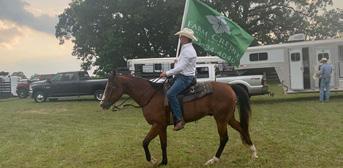
Rural Development Conference
Josh Jones, senior business credit analyst, attended the Arkansas Rural Development Conference in Hot Springs. The conference is designed for anyone interested in improving the quality of life in Arkansas’ rural communities.

Teacher Appreciation
We recognize the vital role educators play in our communities. To say thank you, branches hosted a variety of activities for Teacher Appreciation Week in May.





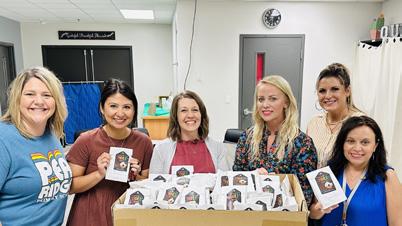
COMMUNITY SCENE
Jessica Hope from Benton County and Jack Berryhill from Hot Spring County are the distinguished recipients of the 2023 Farm Credit of Western Arkansas 4-H Foundation Scholarships.
The Farm Credit logo was spotted at the Greenwood Rodeo.
CLARKSVILLE
BENTONVILLE
RUSSELLVILLE
GLENWOOD
20
TEXARKANA MENA
Chase Hale Memorial 5K
Spark, our employee engagement group, rallied to show their support at the Chase Hale Memorial 5K, an event honoring the memory of Customer Service Representative Heather Hale’s son.
ACLC Visit

On their annual tour, the Arkansas Cattlemen’s Leadership Course stopped by the Russellville branch to learn more about Farm Credit’s role in agriculture.


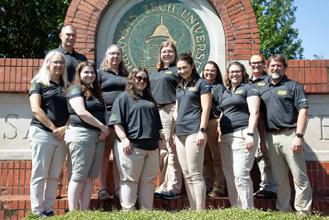
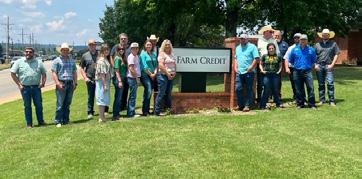
Compass Cold Opening
We celebrated the opening of Compass Cold Storage in Mulberry, AR. This new state-of-the-art facility financed by Farm Credit will bring business and jobs to a rural community while providing a valuable service in the supply chain.
ACA Convention
We partnered with Farm Credit Associations of Arkansas to set up a boot shining station at Arkansas Cattlemen’s Convention.

Kathy Schluterman, Paris loan officer, sponsored her local Cattlemen’s Association monthly meeting.

The Farm Credit Adam McClung Leadership Scholarship is awarded annually at the Arkansas Cattlemen's Association Convention. This year, two recipients were awarded the $1,000 scholarship - Carley Morgan and Jacey Smith (not pictured). Carley is a graduate of Sloan-Hendrix High School and plans to attend Arkansas State University this fall to study animal science. Jacey is a graduate of Decatur High School and plans to attend Northeastern Oklahoma A&M College this fall to study animal science and reproduction.
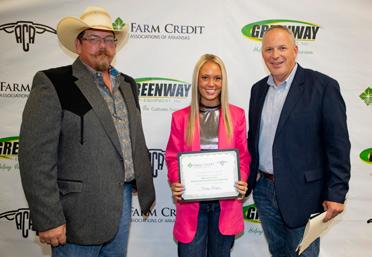
CASE
One way we are able to support agricultural education is through our sponsorship of the Curriculum for Agricultural Science Education (CASE) Institute. This summer, ag educators from five states gathered at Arkansas Tech University to engage in hands-on labs and activities to develop curriculum for their students.
State Officer Dinners
The Farm Credit Associations of Arkansas were proud to present donation checks to both Arkansas FFA and 4-H. Arkansas FFA received a $10,000 donation to the Arkansas FFA Foundation as well as $10,000 for our ongoing commitment towards the Marion D. Fletcher Leadership Center at Camp Couchdale. Arkansas 4-H was presented with a $10,000 donation to the Arkansas 4-H Foundation and a $10,000 commitment towards the building of the Rose Garden Pavilion at the Arkansas 4-H Center.


The Farm Credit Associations of Arkansas followed their annual tradition of meeting the newly elected Arkansas FFA and Arkansas 4-H state officers and treating them to dinner. These 13 young leaders will serve as ambassadors for their respective organizations and agriculture over the next year.

COMMUNITY SCENE
4-H & FFA Donation
Farm Credit Adam McClung Scholarship
Logan Co. Cattlemen’s 21
7 Cooperative Principles
Voluntary Membership
Democratic Member Control
Members’ Economic Participation
Autonomy and Independence
Education, Training, and Information
Cooperation Among Cooperatives
Concern for Community
Cooperatives provide education and training for members, elected representatives, managers and employees so they can contribute effectively to the development of their cooperative. Members also inform the general public about the nature and benefits of cooperatives.
Designed for...
• Ages 18-40, any farming experience welcome
• Any size farming operation
• Both full-time and part-time farmers
• Couples are invited to attend together
22
An
Network with fellow young farmers from across the state at this FREE two-day learning event facilitated by Dr. David Kohl and featuring new breakout workshops designed to help you take home skills to improve your operation’s business practices. *The
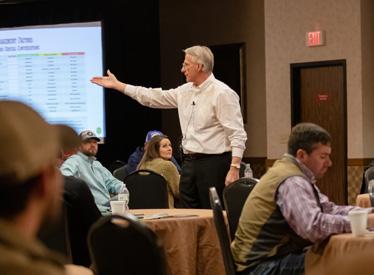


• Network with young, beginning farmers from an array of ag sectors
• Better understand economic factors impacting Arkansas producers
COOPERATIVE SCENE
Statewide Farm Credit Young & Beginning Farmer Conference FREE Conference | FEBRUARY 20-21, 2024
Riverfront, North Little Rock
at myaglender.com by December 15
Call Lindsey Holtzclaw at
Education, Training & Information 2024 Future Legacy
Wyndham
Apply
Questions?
501.339.7858
are
at no charge.
conference, one night’s hotel stay, all food, and evening activity
provided
Participants are responsible for transportation to and from the conference site in North Little Rock.
• Open to all (no need to be a Farm Credit customer) opportunity to...
• Learn skills to better position your operation for success
Community Dollars
Abby Sanders, communications specialist, donated $250 to Johnson County 4-H and Oark FFA. This donation was provided through our Community Involvement Program which sets aside $10,000 per year to recognize employee volunteer efforts in their local communities.


New Faces
BRENDA CARVER

joined Farm Credit in August as principal loan accountant. She is working remotely from New Richmond, WI where she lives with her husband, Matthew. She is originally from Monmouth, IL and has an associate degree from Robert Morris University. Before coming to Farm Credit, Brenda worked at ProPartners Financial where she gained 14 years of accounting experience. In her free time, she enjoys jogging, spending time outdoors, reading, and music.
GAYLA LAIN joined Farm Credit in July as a customer service representative in Hope. She recently moved from the Dallas area to Lake Erling in Taylor, AR. She grew up in 4-H and attended the University of Houston. Outside of work, she stays busy with her gardening, painting, and other creative projects. She is the grandmother of three boys: Cody, Rowdy, and Grayson.
Kyle Webb, Nashville loan officer, donated $500 to Columbus Volunteer Fire Department thanks to Farm Credit’s Community Involvement Program.
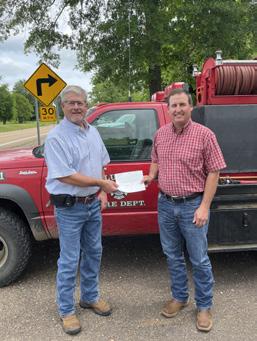
Ginger Tippit, executive assistant, used her Community Involvement dollars to support a team to the ALS Assocation during the 2023 Northwest Arkansas Walk to Defeat ALS.


LINSEY CHOATE
joined Farm Credit in May as a customer service representative in Harrison. Linsey is a Harrison native. In her spare time, she enjoys being outdoors, riding side by sides, and going to concerts. She also enjoys spending time with her family and friends. Linsey is getting married to her fiancé, Sage Estes, in September.



AUTUMN DYER joined Farm Credit in July as a customer service representative in Nashville. Autumn is a lifelong resident of Nashville where her family has a cow-calf operation. She will graduate from Southern Arkansas University this December with a bachelor’s in agribusiness. In her free time, she enjoys being with her family, hunting, fishing, and running her online boutique.
JESSICA PAYTON
joined Farm Credit in April as a customer service representative in Alma. She recently graduated from Arkansas Tech University with a bachelor’s in agricultural business. She is a lifelong resident of Crawford County where her family has a cowcalf operation. In high school, Jessica was a member of 4-H and FFA and currently is a member of Arkansas Women in Agriculture. In her free time, she enjoys gardening and spending time with her two dachshunds, Finny and Frank.
BLAKE SWAIN joined Farm Credit in May as a regional collateral evaluator in Glenwood. He recently graduated from Southern Arkansas University with a bachelor’s in agribusiness. Blake hails from Amity, AR where his family has a cow-calf operation. He is an FFA alumnus and current member of Arkansas Cattlemen’s Association. In his free time, he enjoys hunting, fishing, and spending time on the farm. Before coming to Farm Credit, he worked at the LSU Ag Center as a research farm specialist managing their cattle herd.

WESTERN SCENE
23
3115 W. 2nd Court
Russellville, AR 72801

Let Farm Credit’s industry-leading knowledge, competitive products, and more than 107 years of agricultural and rural financing experience help you.

• Farms of all sizes
• Livestock
• Country home and home construction
• Land



• Recreational land
• Timber tracts
• Forestry products and processing






 Farm Credit of Western Arkansas is an equal opportunity employer and does not discriminate on the basis of race, color, religion, gender, sexual orientation, gender identity or expression, national origin, age, disability, genetic information, marital status, amnesty, or status as a protected veteran in accordance with applicable federal, state and local laws.
Brandon Haberer
Farm Credit of Western Arkansas is an equal opportunity employer and does not discriminate on the basis of race, color, religion, gender, sexual orientation, gender identity or expression, national origin, age, disability, genetic information, marital status, amnesty, or status as a protected veteran in accordance with applicable federal, state and local laws.
Brandon Haberer










 Anna Lester (far left) and Taylor Plugge (far right) have served as the Witts loan officers throughout their purchase and growth of Blossomberry Nursery.
Anna Lester (far left) and Taylor Plugge (far right) have served as the Witts loan officers throughout their purchase and growth of Blossomberry Nursery.






































 By: Casey Ford, County Extension Agent Staff Chair from Franklin County
By: Casey Ford, County Extension Agent Staff Chair from Franklin County















































